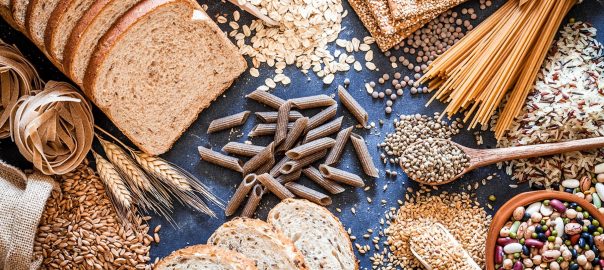
Low Carb & Gluten Free Dieting
Diets Explained: Gluten Free vs. Low Carb
We break down the differences between gluten-free and low carb diets and provide tips on how you can incorporate gluten-free and low carb products into your lifestyle.
Disclaimer: The information in this article is not medical advice. A low carb diet may not be suitable for you. Consult your health care provider before making any changes to your lifestyle or use at your own risk.
Gluten-free and low carb diets are both trendy topics in the health and nutrition communities. You will often find some overlap between these two lifestyle approaches, but they can provide very different benefits. In this article, we cover the basics of a gluten-free diet and the benefits of eliminating gluten from your diet. In addition, we also compare the benefits of gluten-free versus low carb dieting and how you can potentially incorporate both principles in your diet.
What is Gluten?
Gluten is a form of protein found in wheat, barley, rye and triticale. It is responsible for the chewy texture of things like breads and baked goods, acts as a binding agent, and allows doughs to rise. Foods traditionally made from wheat flour such as crackers, pasta and cereals contain gluten. However, a lot of processed and packaged food including things like soups, sauces, condiments and processed meats can also contain gluten to improve texture and flavour.
Why is Gluten Considered “Bad”?
Gluten allergies and intolerances have become increasingly widespread over the last several years. Many people are discovering that their bodies cannot process gluten, which can lead to conditions ranging from mild intolerances causing digestive problems to serious autoimmune diseases such as celiac disease.
It is true for all of us that some components of gluten cannot be broken down by the enzymes in our digestive tracts. For most, this doesn’t pose an issue and undigested gluten simply passes through the body. However, certain people are genetically susceptible to more harsh reactions triggered by consuming gluten. For those with celiac disease, the body responds to gluten by attacking the small intestine. This can cause damage to the digestive tract which prevents nutrients from any food from being absorbed by the body. As a result, people with untreated celiac disease can develop other conditions such as type 1 diabetes, multiple sclerosis, rashes, low iron levels, loss of bone strength, infertility, intestinal cancers and neurological conditions such as epilepsy. In these cases, the best treatment is lifelong abstinence from gluten.
For the rest of the population not suffering from celiac disease or gluten intolerances, gluten is unlikely to cause serious health issues. Some people might find that when they eat gluten-rich foods such as bread, pasta or baked goods that they experience some uncomfortable digestive symptoms such as bloating, gas, or abdominal pain. More severe symptoms may include rash, nausea, diarrhea or vomiting. In any of these cases, if eating a certain food causes an uncomfortable reaction, it is best to get tested and stay away from those foods until you are sure they are safe for you to consume.
Is Gluten-Free Healthier?
Eliminating gluten from your diet may open up the doors to a healthier lifestyle. For example, many foods that are considered unhealthy and associated with weight gain, such as packaged and processed foods, contain gluten. However, it should be noted that gluten may not be the main culprit here. Rather, the high amounts of refined sugars and inflammatory vegetable oils found in processed foods are more likely responsible for weight gain and other negative health effects.
Some of the benefits of a gluten-free diet are listed below. Note that these may be especially true for those suffering from gluten intolerances or celiac disease.
- Improved energy levels.
People with gluten intolerances can suffer from chronic fatigue. This happens because gluten damages the digestive tract, impairing its ability to absorb other nutrients that give our bodies energy to function and thrive. If you think you have a gluten sensitivity, try eliminating it from your diet to give your intestines a chance to heal. This will allow them to return to normal functioning to give your body all the nutrients it needs and provide you with more energy to perform daily tasks.
- Reduced inflammation.
When the body is intolerant or sensitive to a certain food, eating it can cause more oxidative stress in the body. Oxidative stress leads to inflammation, which can cause serious damage to organs and cells if it is sustained over long periods of time (i.e. if you eat gluten every day and are intolerant). A gluten-free diet can reduce inflammation in gluten sensitive individuals, which can in turn reduce things like joint pain, muscle aches, fatigue, frequent infections and more serious illnesses.
- Improved mood and mental function.
One of the major organs affected by nutrient deficiency is, of course, the brain. This is because the gut and the brain are highly connected. They constantly exchange messages and signals, such as when you have eaten a big meal, and the gut sends a message to the brain to produce a certain hormone that tells you to stop eating. However, it goes far beyond this in the case of gluten intolerances. People with celiac disease are more likely to suffer from headaches, migraines and depression. By eliminating gluten, people with gluten intolerances can rebalance their gut flora and improve nutrient absorption, which both have a big effect on brain health.
- Improved skin health and appearance.
Gluten also has many negative effects on the skin for those who are sensitive to it. People with undiagnosed gluten intolerance or celiac disease are more prone to skin rashes, eczema and psoriasis. A gluten-free diet can help these individuals improve their skin health and eliminate these conditions.
- Stronger bones.
One of the key nutrients associated with good bone health is calcium. However, when individuals cannot absorb this nutrient due to a gluten intolerance, they are more likely to suffer from bone problems such as osteoporosis and osteopenia. Many studies have shown that celiac patients who followed a gluten-free diet experienced an improvement in bone mineral density. This can become especially important when we get older, as our bones naturally lose nutrients as we age.
Are Gluten-Free and Low Carb the Same?
If you are thinking that a gluten-free diet sounds a lot like a low carb diet, you are partially right. Many gluten-free foods are made with low carb alternatives, such as almond flour, flaxseed meal or soy. However, not everything that is gluten-free is low carb. For example, gluten-free foods also include oats, quinoa, buckwheat, amaranth, corn, rice, potato, tapioca and bean flours. While there is some overlap, it’s not safe to assume that gluten-free equates to low carb. However, a low carb diet may be something to consider if you are gluten intolerant as most low carb or ketogenic diets tend to be low in gluten. Just be sure to check the labels of low carb foods, especially things you may not expect to contain gluten such as jerky, soups, broths and sausages.
How to Go Gluten-Free
If you think a gluten-free diet may be right for you, then here are a few things to know about going gluten-free!
First of all, you might have to say goodbye to some of the things you love such as traditional bread, pasta, cereal, pizza, baked goods, and beer (made from barley). In addition, get into the habit of reading food labels on everything you buy, as gluten can lurk in the most unexpected places such as frozen foods, sauces, meats, cheeses and even toothpaste!
Also, be aware that there are different varieties of wheat, which all contain gluten. These include:
- Durum
- Kamut
- Spelt
- Semolina
- Einkorn
- Emmer
If you are highly gluten intolerant or suffer from celiac disease, you may also want to take other precautions in your home and when you’re out to avoid cross contamination with gluten. This might include storing certain foods separately in your home, frequently cleaning cooking surfaces and appliances, and reading restaurant menus ahead of time to make sure they have gluten-free options.
Finally, you should address any nutritional gaps in your diet with your doctor. In North America, many foods are made with enriched wheat flours which provide nutrients such as iron, folic acid, calcium, fibre and B Vitamins that are essential to your health. When you eliminate these foods, you may become deficient in some of these nutrients as gluten-free alternatives cannot always provide the same amounts. Whether you choose to take supplements or find other dietary sources of these foods, be sure to maintain a balanced diet. Otherwise, a gluten-free diet could cause other health problems or unpleasant side effects such as fatigue, constipation or unintentional weight gain.
Gluten-Free Low Carb Products
Check out these gluten-free low carb products available at The Low Carb Grocery:
-
- Eve’s Crackers – Gluten-Free, Vegan, Keto
- Glutenull Gluten-Free, Vegan, Low Carb Cookies, Granola and Snack Bars
- Clean Eating High Fibre Crispbreads – Parmesan & Cinnamon
- Nutilight Gluten-Free Dark Chocolate Hazelnut Spread Plus PROTEIN
- Organico Bello Gluten-Free Pasta Sauce
Click here to see more of our gluten-free products. You can also find a “GF
Stay Connected
We hope that this article helped clarify some of the differences and similarities between a gluten-free lifestyle and a low-carb diet. Still have questions or want to learn more? Join our online discussions on Facebook and Instagram! You can also subscribe to our newsletter to get the most up-to-date keto and low-carb news and product sales! We’d also love to hear about your experiences with The Low Carb Grocery over on our Google Reviews.






